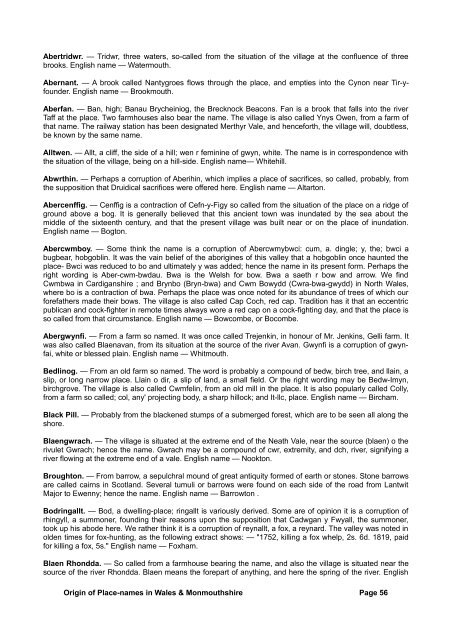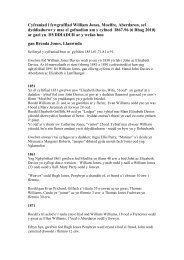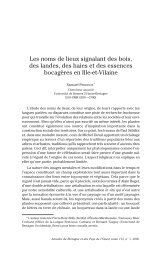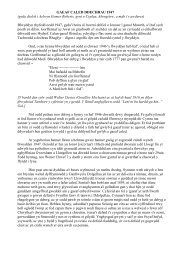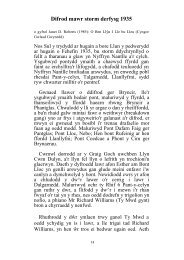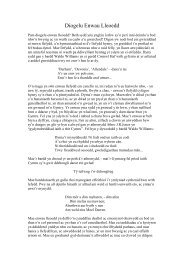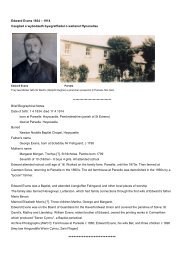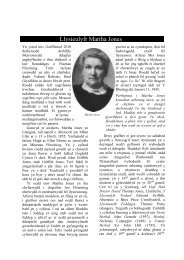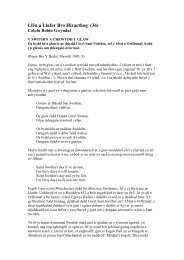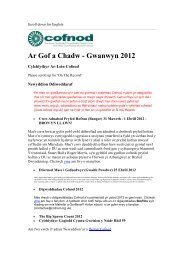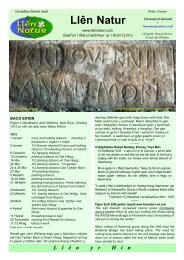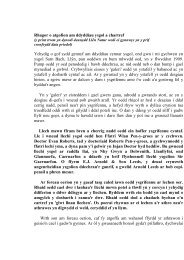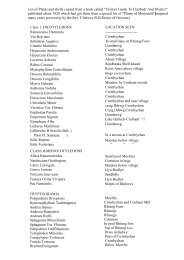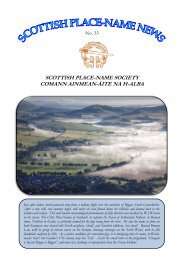handbook of the origin of place-names in wales and monmouthshire
handbook of the origin of place-names in wales and monmouthshire
handbook of the origin of place-names in wales and monmouthshire
- No tags were found...
You also want an ePaper? Increase the reach of your titles
YUMPU automatically turns print PDFs into web optimized ePapers that Google loves.
Abertridwr. — Tridwr, three waters, so-called from <strong>the</strong> situation <strong>of</strong> <strong>the</strong> village at <strong>the</strong> confluence <strong>of</strong> threebrooks. English name — Watermouth.Abernant. — A brook called Nantygroes flows through <strong>the</strong> <strong>place</strong>, <strong>and</strong> empties <strong>in</strong>to <strong>the</strong> Cynon near Tir-yfounder.English name — Brookmouth.Aberfan. — Ban, high; Banau Bryche<strong>in</strong>iog, <strong>the</strong> Brecknock Beacons. Fan is a brook that falls <strong>in</strong>to <strong>the</strong> riverTaff at <strong>the</strong> <strong>place</strong>. Two farmhouses also bear <strong>the</strong> name. The village is also called Ynys Owen, from a farm <strong>of</strong>that name. The railway station has been designated Merthyr Vale, <strong>and</strong> henceforth, <strong>the</strong> village will, doubtless,be known by <strong>the</strong> same name.Alltwen. — Allt, a cliff, <strong>the</strong> side <strong>of</strong> a hill; wen r fem<strong>in</strong><strong>in</strong>e <strong>of</strong> gwyn, white. The name is <strong>in</strong> correspondence with<strong>the</strong> situation <strong>of</strong> <strong>the</strong> village, be<strong>in</strong>g on a hill-side. English name— Whitehill.Abwrth<strong>in</strong>. — Perhaps a corruption <strong>of</strong> Aberih<strong>in</strong>, which implies a <strong>place</strong> <strong>of</strong> sacrifices, so called, probably, from<strong>the</strong> supposition that Druidical sacrifices were <strong>of</strong>fered here. English name — Altarton.Abercenffig. — Cenffig is a contraction <strong>of</strong> Cefn-y-Figy so called from <strong>the</strong> situation <strong>of</strong> <strong>the</strong> <strong>place</strong> on a ridge <strong>of</strong>ground above a bog. It is generally believed that this ancient town was <strong>in</strong>undated by <strong>the</strong> sea about <strong>the</strong>middle <strong>of</strong> <strong>the</strong> sixteenth century, <strong>and</strong> that <strong>the</strong> present village was built near or on <strong>the</strong> <strong>place</strong> <strong>of</strong> <strong>in</strong>undation.English name — Bogton.Abercwmboy. — Some th<strong>in</strong>k <strong>the</strong> name is a corruption <strong>of</strong> Abercwmybwci: cum, a. d<strong>in</strong>gle; y, <strong>the</strong>; bwci abugbear, hobgobl<strong>in</strong>. It was <strong>the</strong> va<strong>in</strong> belief <strong>of</strong> <strong>the</strong> ab<strong>orig<strong>in</strong></strong>es <strong>of</strong> this valley that a hobgobl<strong>in</strong> once haunted <strong>the</strong><strong>place</strong>- Bwci was reduced to bo <strong>and</strong> ultimately y was added; hence <strong>the</strong> name <strong>in</strong> its present form. Perhaps <strong>the</strong>right word<strong>in</strong>g is Aber-cwm-bwdau. Bwa is <strong>the</strong> Welsh for bow. Bwa a saeth r bow <strong>and</strong> arrow. We f<strong>in</strong>dCwmbwa <strong>in</strong> Cardiganshire ; <strong>and</strong> Brynbo (Bryn-bwa) <strong>and</strong> Cwm Bowydd (Cwra-bwa-gwydd) <strong>in</strong> North Wales,where bo is a contraction <strong>of</strong> bwa. Perhaps <strong>the</strong> <strong>place</strong> was once noted for its abundance <strong>of</strong> trees <strong>of</strong> which ourforefa<strong>the</strong>rs made <strong>the</strong>ir bows. The village is also called Cap Coch, red cap. Tradition has it that an eccentricpublican <strong>and</strong> cock-fighter <strong>in</strong> remote times always wore a red cap on a cock-fight<strong>in</strong>g day, <strong>and</strong> that <strong>the</strong> <strong>place</strong> isso called from that circumstance. English name — Bowcombe, or Bocombe.Abergwynfi. — From a farm so named. It was once called Trejenk<strong>in</strong>, <strong>in</strong> honour <strong>of</strong> Mr. Jenk<strong>in</strong>s, Gelli farm. Itwas also called Blaenavan, from its situation at <strong>the</strong> source <strong>of</strong> <strong>the</strong> river Avan. Gwynfi is a corruption <strong>of</strong> gwynfai,white or blessed pla<strong>in</strong>. English name — Whitmouth.Bedl<strong>in</strong>og. — From an old farm so named. The word is probably a compound <strong>of</strong> bedw, birch tree, <strong>and</strong> lla<strong>in</strong>, aslip, or long narrow <strong>place</strong>. Lla<strong>in</strong> o dir, a slip <strong>of</strong> l<strong>and</strong>, a small field. Or <strong>the</strong> right word<strong>in</strong>g may be Bedw-Imyn,birchgrove. The village is also called Cwmfel<strong>in</strong>, from an old mill <strong>in</strong> <strong>the</strong> <strong>place</strong>. It is also popularly called Colly,from a farm so called; col, any' project<strong>in</strong>g body, a sharp hillock; <strong>and</strong> It-llc, <strong>place</strong>. English name — Bircham.Black Pill. — Probably from <strong>the</strong> blackened stumps <strong>of</strong> a submerged forest, which are to be seen all along <strong>the</strong>shore.Blaengwrach. — The village is situated at <strong>the</strong> extreme end <strong>of</strong> <strong>the</strong> Neath Vale, near <strong>the</strong> source (blaen) o <strong>the</strong>rivulet Gwrach; hence <strong>the</strong> name. Gwrach may be a compound <strong>of</strong> cwr, extremity, <strong>and</strong> dch, river, signify<strong>in</strong>g ariver flow<strong>in</strong>g at <strong>the</strong> extreme end <strong>of</strong> a vale. English name — Nookton.Broughton. — From barrow, a sepulchral mound <strong>of</strong> great antiquity formed <strong>of</strong> earth or stones. Stone barrowsare called cairns <strong>in</strong> Scotl<strong>and</strong>. Several tumuli or barrows were found on each side <strong>of</strong> <strong>the</strong> road from LantwitMajor to Ewenny; hence <strong>the</strong> name. English name — Barrowton .Bodr<strong>in</strong>gallt. — Bod, a dwell<strong>in</strong>g-<strong>place</strong>; r<strong>in</strong>gallt is variously derived. Some are <strong>of</strong> op<strong>in</strong>ion it is a corruption <strong>of</strong>rh<strong>in</strong>gyll, a summoner, found<strong>in</strong>g <strong>the</strong>ir reasons upon <strong>the</strong> supposition that Cadwgan y Fwyall, <strong>the</strong> summoner,took up his abode here. We ra<strong>the</strong>r th<strong>in</strong>k it is a corruption <strong>of</strong> reynallt, a fox, a reynard. The valley was noted <strong>in</strong>olden times for fox-hunt<strong>in</strong>g, as <strong>the</strong> follow<strong>in</strong>g extract shows: — "1752, kill<strong>in</strong>g a fox whelp, 2s. 6d. 1819, paidfor kill<strong>in</strong>g a fox, 5s." English name — Foxham.Blaen Rhondda. — So called from a farmhouse bear<strong>in</strong>g <strong>the</strong> name, <strong>and</strong> also <strong>the</strong> village is situated near <strong>the</strong>source <strong>of</strong> <strong>the</strong> river Rhondda. Blaen means <strong>the</strong> forepart <strong>of</strong> anyth<strong>in</strong>g, <strong>and</strong> here <strong>the</strong> spr<strong>in</strong>g <strong>of</strong> <strong>the</strong> river. EnglishOrig<strong>in</strong> <strong>of</strong> Place-<strong>names</strong> <strong>in</strong> Wales & Monmouthshire Page 56


